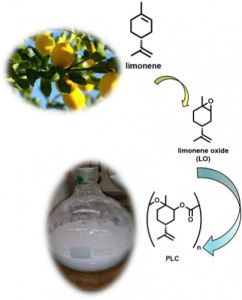 Prof. Kleij is pushing waste valorisation to an extreme. His research group has been involved over the last years in the development of homogeneous catalysts based on earth-abundant metals such as iron and aluminium for the incorporation of the carbon dioxide molecule into substrates in order to form carbonate or urethane functionalities. This lead the group to develop sustainable methods for the preparation of cyclic carbonates from epoxide or oxetane starting materials. In particular, the group selected limonene oxide, a terpene oxide derived from non-edible biomass (limonene is mostly found in the peel of citrus fruits) and successfully prepared polycarbonate incorporating carbon dioxide within the polymer chain. The resulting polycarbonate bears a pendent additional double bond in each repeating unit which makes it suitable for further functionalization. This synthesis was successfully scaled-up at ICIQ at the >300 g scale. Using the in-house developed chemistry, this pending double bond was successfully converted into a cyclic carbonate, which produced a dicarbonate polymer with surprising high glass transition temperature. Sustainable materials incorporating carbon dioxide and biomass-derived waste are therefore in reach thanks to this platform.
Prof. Kleij is pushing waste valorisation to an extreme. His research group has been involved over the last years in the development of homogeneous catalysts based on earth-abundant metals such as iron and aluminium for the incorporation of the carbon dioxide molecule into substrates in order to form carbonate or urethane functionalities. This lead the group to develop sustainable methods for the preparation of cyclic carbonates from epoxide or oxetane starting materials. In particular, the group selected limonene oxide, a terpene oxide derived from non-edible biomass (limonene is mostly found in the peel of citrus fruits) and successfully prepared polycarbonate incorporating carbon dioxide within the polymer chain. The resulting polycarbonate bears a pendent additional double bond in each repeating unit which makes it suitable for further functionalization. This synthesis was successfully scaled-up at ICIQ at the >300 g scale. Using the in-house developed chemistry, this pending double bond was successfully converted into a cyclic carbonate, which produced a dicarbonate polymer with surprising high glass transition temperature. Sustainable materials incorporating carbon dioxide and biomass-derived waste are therefore in reach thanks to this platform.
References:
ACS Catal. 2017, 7, 3860−3863